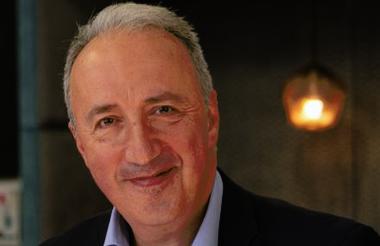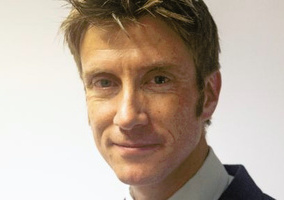With over 35 years in the Royal Air Force, an MBE, and several years as an aide-de-camp to the late Queen Elizabeth II under his belt, Shaw Trust CEO Chris Luck is no stranger to public service.
After starting his career in the RAF in 1984, Luck served in the likes of Northern Ireland, Belize and Iraq, clocking up more than 5,000 military flying hours and eventually ascending the ranks to air vice-marshal.
But in 2019, Luck decided to leave the RAF after “a lifetime” of serving the public, for the charity sector – a very different environment he nonetheless describes as being similarly “purpose and mission oriented”.
‘A service career teaches you about the importance of your people’
As a result, his move to the Shaw Trust welfare-to-work charity in 2020 felt like a natural fit.
“It mapped quite neatly onto my own personal values and motivations,” he says. “I think that’s what enabled me to break the bonds of 35 years with defence… because I had an option, obviously, to stay in defence.
“It was the breadth and the depth and the focus of what it [the Shaw Trust] did that really spoke to my values.”
The charity – founded in 1982 to support disabled people into employment – has since expanded into a leading provider of educational, training and employment support opportunities for largely underserved communities across the country.
The Shaw Trust’s focus on education and training, which it describes as supporting people “from child to career”, was especially appealing to Luck, who spent his final forces years as the commandant of RAF College Cranwell and later of the Joint Services Command and Staff College. He remains “very passionate” about education’s ability to help every individual progress.
Luck also describes himself as a “lifelong learner”, having attended the US Air Force Air Command and Staff College and later the USAF School of Advanced Air and Space Studies. He was the first non-American participant there, graduating with a masters in strategic air power.
His time in the RAF has “absolutely” informed his approach to leading the UK’s 14th largest charity, Luck says. He references “really, really portable skills” and an ethos that seems very much focused around “getting out and about”, or, as Luck puts it, “seeing the troops”.
“The one thing a service career teaches you is the paramount importance of people – and your people – and the fact that everything is achieved through a sense of team,” he says.
Luck zeroes in on the importance of “being able to build, motivate, organise and shape teams as the need changes” within charities. “I think that’s a really valuable skill to actually bring into the Shaw Trust and into the sector,” he says. “I think that really helped.”
‘Really, really comfortable with uncertainty’
Having reached such a senior role in his past professional life also played to Luck’s advantage when taking on the role of CEO of a large, nationwide charity on the eve of one of the most turbulent periods in modern history.
The consecutive national and global crises – Covid-19, the cost-of-living crisis, political turmoil, to name but a few – have not felt entirely alien to him. In fact, his lengthy RAF career has prepared him well for managing such crises.
“I was very comfortable with large-scale, complex and diverse organisations, which the Shaw Trust was, so that helped me,” he says.
“The sector has coped with some fundamental shifts, tectonic plates shifting, and well-established pillars one could rely on fundamentally changing overnight.
“What I was able to bring into the beginning of that crisis period was being really, really comfortable with uncertainty, with complex and very fluid and dynamic environments – which is the world of defence – and being able to reorganise, then reset, in order to still deliver outcomes.”
While 2020 would have been far from a plain-sailing inaugural year for even the most seasoned charity CEO – let alone one that had never before worked in the sector – Luck took it in his stride.
In the face of the Covid-19 pandemic, he drew on his previous experience in crisis contingency planning to benefit the Shaw Trust and guide its staff through immense uncertainty.
“Timing-wise, it couldn’t be better for the Shaw Trust, as far as me becoming CEO [goes],” Luck says.
Throughout the difficult pandemic and post-pandemic years, where many large charities saw their incomes drop temporarily, the Shaw Trust’s annual income always remained steadily on the increase.
“I could bring a whole raft of fresh perspectives and fresh ideas and a fresh approach in a complex moment and put that to good use,” he goes on. “So, I felt the circumstances played to my strengths.”
The ‘we’ mentality
When the conversation turns to Luck’s proudest achievements across his six-year tenure, he places emphasis on many of these accomplishments being not simply personal but shared with his team.
“Helping Shaw Trust reset, reorganise, refocus, and then – with determination – to move into really creating genuine social value outcomes along its child-to-career spectrum, is something I’m very pleased about,” he says.
Most recently under Luck’s leadership, the Shaw Trust’s Education to Employment Pathway division has been awarded a ‘Good’ from Ofsted; its education division, which operates 29 academy schools, opened a specialist free school in Bury, and, as the largest provider of statutory careers guidance nationwide, the trust grew the number of schools purchasing its services by 10% in 2023/4.
Alongside the charity’s cause-focused achievements, Luck is also immensely proud of the “purposeful and motivating” environment and culture he and his senior colleagues have fostered for the Shaw Trust’s 3,000 staff.
“I’ve always put our people first,” he says, echoing his earlier comments about his focus on teamwork. “Invest in your people so they can invest in the mission and the purpose.”
‘Creating a sense of momentum’
Against the backdrop of a sector battling poor retention and recruitment rates, Luck says he is focused on ensuring the Shaw Trust remains an attractive place to work. That includes delivering on the voluntary Real Living Wage, as well as offering “constant” professional development for staff.
He adds: “We’ve very proud of the fact that we spend an enormous amount of the apprenticeship levy we charge investing back into our people, developing things like Future Leaders [fast-track executive programme], investing in them as individuals, and creating a real sense of purpose and momentum.”
Luck says the strength of the Trust’s workplace culture is reflected in the “awful lot” of employees who wish to stay, despite “a lot of turbulence” when government contracts – a crucial income source – start and finish.
“We have a very healthy and active internal career pathway where people can move between contracts, and between divisions and areas,” he says.
Retention is ultimately to the advantage of the whole organisation – and its beneficiaries. “That energy of being part of something special, that you want to stay with, flows through into how [staff] treat participants, how they connect with our stakeholders.”
Shaw Trust in ‘fortunate’ position amid NIC increase
At the time of our interview, the new financial year had just started. With it, a host of new financial measures implemented by the government have taken effect.
Among the most controversial in the sector is the increase in employer national insurance contributions (NICs), which will cost charities an extra £1.4bn annually.
As a large charity, Luck acknowledges the Shaw Trust remains “fortunate” in its position, despite the NIC increase’s challenges.
“Would I have liked to have put money to more use, to create more social value within the programmes we deliver, or additional value to our commissioners and to those we help? Of course,” he says.
“But we’re in a position where we can soak it up without detriment to organisation or structure or individuals,” Shaw goes on, while admitting the changes still represent “a significant diversion of potential resources”.
“I also understand where the nation is at the moment, and the need for the chancellor to raise revenue,” he says.
‘The proof of the pudding is in the eating’
Another much-discussed topic in the sector has been the upcoming Civil Society Covenant setting the relationship between charities and the government, which is being co-produced by umbrella bodies NCVO and ACEVO ahead of its publication later this year.
Like many charity CEOs, Luck finds the covenant a step in the right direction overall.
“I’m always encouraged by the fact there’s a conversation, but the needs and demands of civil society morph over time anyway, so conversation needs to always be ongoing,” he says.
“The fact that this government is proactively and strongly talking about a civil society conversation, and coming together and working together to move everybody forwards, is good news. We can only really support that.”
Yet if Luck’s many years of service – and the past few of being a charity CEO – have shown him anything, it’s that the future is never quite certain.
“We’ll see how far it goes. The proof of what is in the pudding is the eating,” he says. “But we can only be encouraged by it.”
Related articles












